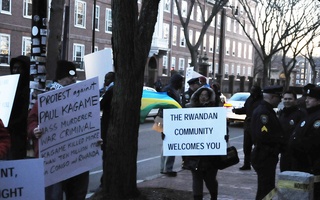Every April, Rwandan students peform the cathartic ritual of commemorating the victims of the Rwandan genocide, bringing to life the memories of those who were affected by the tragedy in 1994.
“We can’t forget them. We’re humans. We can’t just move on and forget them,” says Pauline Mutumwinka ’12. “They do not deserve to be forgotten.”
After a plane carrying Rwandan president Juvénal Habyarimana was shot down on April 6, 1994, violence erupted between the minority Tutsi and majority Hutu populations, resulting in the death of over 800,000 men, women, and children.
Thousands of miles and eight years removed from the tragedy, Rwandan students at Harvard continue to grapple with the pain of the dark moment in their country’s history, commemorating and raising awareness about the genocide each April at Harvard.
“I think that the country has many challenges that we have to face,” Mutumwinka says. “We need to constantly engage with our memory and see what it means for us.”
UNDERSTANDING CONFLICT
“I was in Kenya when the genocide happened. I was a young child,” Mutumwinka recalls. Her neighbors told her that there had been waves of ethnic violence in Rwanda. She asked her parents if it was true, and they told her it was. But they were reluctant to talk about what was going on.
“I heard horror stories, but it was never really clear to me,” Mutumwinka says. The first day she returned to Rwanda she saw a congregation that was displaying the skulls of victims. “That was the first time I had actually encountered death. The death of so many people.”
Mutumwinka says she was terrified and wanted to return to Kenya.
As she grew older, Mutumwinka says that she came to accept and understand the tragedy, and that it has shaped her views on the nature of conflict and violence.
“It has really built my interest in conflict in general. I think it makes me very sensitive to attitudes that could lead to conflicts—I’m very wary,” Mutumwinka says.
A COMMEMORATION FAR FROM HOME
For some Rwandan students, commemoration is a responsibility, as well as a ritual embedded with meaning.
“Commemorating is something that as a Rwandan, I have to do,” Juliet Musabeyezu ’15 says.
Musabeyezu helped to organize a commemoration in Holden Chapel for the victims of the Rwandan genocide earlier this month. The ceremony opened with a video that explained the history of the genocide. Afterward, a panel of students answered questions and facilitated a conversation about the genocide.
Read more in News
Ugandan Student Accepted to Harvard, with Help from Kasiisi ProjectRecommended Articles
-
Against a Sea of TroublesT he images are the worst in a decade. Hundreds of emaciated corpses line the sun-baked gravel roads. The bodies
-
Movie Review - Hotel Rwanda“Genocide blockbuster” is definitely not the easiest tagline to sell, especially for a film released during the packed holiday film
-
Rwandan President Links Technology to DevelopmentRwandan President Paul Kagame stressed the need for using science to accelerate Africa’s socioeconomic transformation in a speech at MIT’s
-
 Rwandan President Addresses Criticism at IOP
Rwandan President Addresses Criticism at IOP -
Harvard Platform is Justice for Kagame and RwandaWhile Paul Kagame admittedly may not be the “ideal” paragon of democracy, there seems to be a well-oiled conveyor belt that sustains lies against him.













